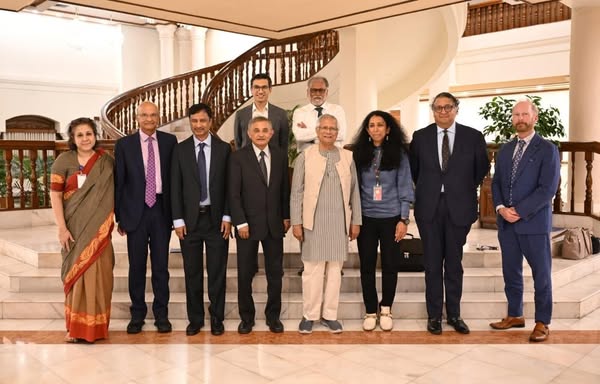A US-based company has announced plans to introduce a “revolutionary” portable AI-powered ultrasound device in Bangladesh, marking a significant advancement in the country’s healthcare sector, according to a post on the verified Facebook page of the Chief Adviser.
Officials from the company, Exo Imaging, led by its co-founders Yusuf Haque and Sandeep Akkaraju, met with Chief Adviser Professor Muhammad Yunus on Thursday at the state guest house Jamuna to discuss the groundbreaking technology and its potential impact.
Yusuf Haque, a Bangladeshi-origin US medical technology expert and Exo’s Chief Technology Officer, said the company plans to initially roll out the device in leading hospitals across Bangladesh, with a long-term vision to expand access to rural and community healthcare centers.
“This device is designed to be portable and highly efficient, making high-quality diagnostics more accessible, even in remote areas,” he said.
“It will revolutionize healthcare across the globe, especially in places like rural Bangladesh. Doctors and nurses will soon use it like a stethoscope,” Haque added.
Sandeep Akkaraju, Chief Executive Officer of Exo, stated that Bangladesh is the first country in Asia to adopt the technology, which is currently available only in the United States under approval from the US Food and Drug Administration (FDA).
“We are also planning to launch it in Mexico and several Latin American countries soon,” Akkaraju said.
The AI-powered portable ultrasound device can assist in the early detection of a wide range of conditions, including heart disease, tuberculosis, breast cancer, lung disease, thyroid issues, and pregnancy-related complications.
Chief Adviser Professor Muhammad Yunus welcomed the initiative, calling it a major step toward achieving universal healthcare access.
“It sounds like science fiction,” he remarked. “AI plays a remarkable role in healthcare. As we know, treatment begins with diagnosis. Patients often become more ill while waiting for tests. This technology can help reduce that burden by bringing diagnostics closer to the patient.”
Highlighting the device’s portability, Haque noted:
“Doctors and health workers can take the device directly to patients, removing the need for long waits or travel.”
Omar Ishrak, a board member at Exo and former Chairman of Intel Corporation, added:
“This is a game changer for countries like Bangladesh. Around 80 percent of the world’s population lacks access to quality healthcare. This kind of technology can help close that gap.”
“Patients with chronic illnesses such as breast cancer need frequent screenings. This device makes that process more convenient. It’s essentially the next-generation stethoscope — a powerful tool that provides instant, AI-driven diagnostic insights,” he said.
Akkaraju also shared that Exo is developing complementary software to help healthcare workers prioritize patients based on urgency, send follow-up reminders, and streamline communication between patients and providers.
“This is the next stage of telemedicine,” he added.
Among those present at the meeting were Special Assistant to the Chief Adviser Sayedur Rahman, BIDA Executive Chairman Chowdhury Ashik Mahmud Bin Harun, and Senior Secretary for SDG Affairs Lamiya Morshed.

